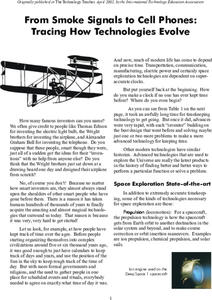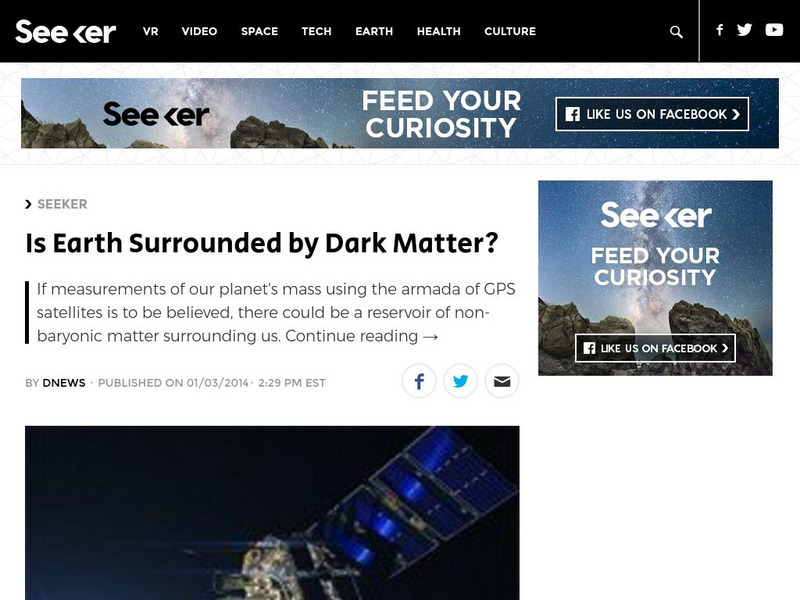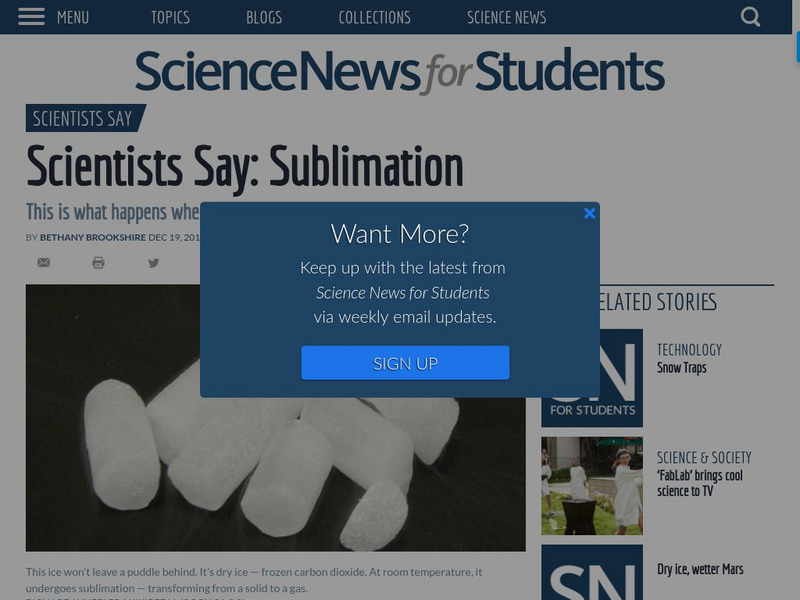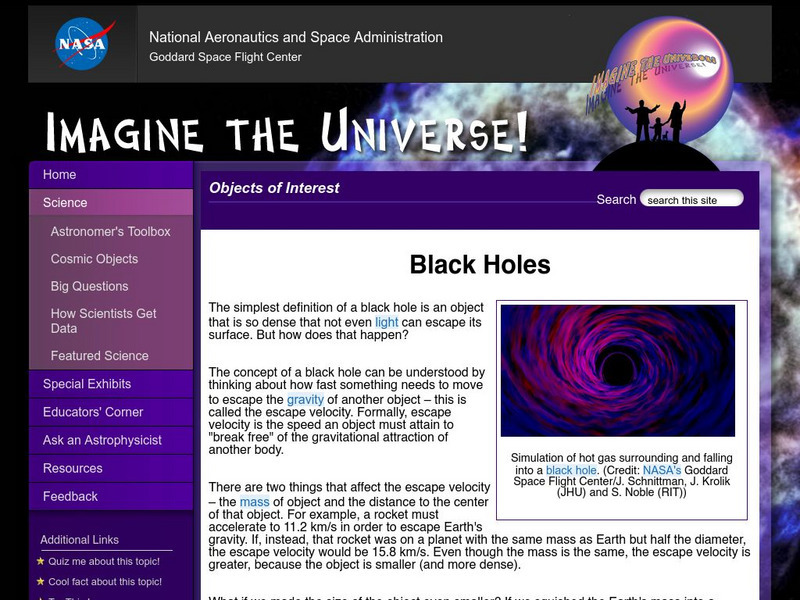NASA
From Smoke Signals to Cell Phones: Tracing How Technologies Evolve
Explore the science of space exploration. Pupils consider technological advances in propulsion, communication, power, navigation, and imaging. They select one of these areas and create a timeline of historical progress that contributed...
NASA
Water Works on a Blue Planet
Keep within a water budget. Learners find out that less than 2.5% of Earth's water is available to drink—and that there is a fixed amount of water. Scholars read an interesting article comparing the available water to a game of Monopoly...
NASA
Taking Apart the Light
Break down light into spectra. Scholars learn how atoms emit and absorb photons and come to understand how this process allows scientists to identify different atoms based on either absorption lines or emission lines. Learners then...
Khan Academy
Khan Academy: Biology: Chemistry of Life: Matter, Elements, and Atoms
Did you know matter is made up of atoms? In this article learn about the smallest unit of matter called the atom.
Other
The Ultimate Nature of Matter
Modern science is based on the idea of matter. This essay, by Alan Bradnam of the University of Sheffield (UK), discusses the impact of this idea on the world of science.
Story Behind the Science
Story Behind the Science: The Story of Dark Matter [Pdf]
The scientific history behind the discovery of dark matter. Questions are posed throughout about how theories are developed to provide possible explanations of natural phenomena.
Open Curriculum
Open Curriculum: Recycling Matter in Ecosystems
Students learn about biogeochemical cycles that recycle matter on Earth.
Seeker
Seeker: Week of 1 6 14: Is Earth Surrounded by Dark Matter?
Article reports on a presentation that suggests that the Earth is surrounded by dark matter.
Open Curriculum
Open Curriculum: Matter
Students will be able to describe elements and compounds, and explain how mixtures differ from compounds.
Society for Science and the Public
Science News for Students: Scientists Say: Sublimation
Sublimation is what happens when matter goes straight from solid to gas. Check out the details of the process.
PBS
Pbs Learning Media: Diamonds: The Science Behind the Sparkle
This illustrated essay from the NOVA Web site explains why the atomic structure of a diamond slows down light and produces a sparkle more brilliant than from any other colorless substance.
Open Curriculum
Open Curriculum: Matter as a Wave
This article helps illustrate the behavior of electrons as waves and the uncertainty principle.
University of Alaska
Alaska Science Forum: Plasma: The Fourth State of Matter
Good discussion on the conditions and natural existence of plasmas.
Nobel Media AB
The Nobel Prize: Press Release: The Nobel Prize in Physics 2016
The Royal Swedish Academy of Sciences has decided to award the Nobel Prize in Physics 2016 with one-half to David J. Thouless of University of Washington and the other half to both F. Duncan M. Haldane of Princeton University and J....
Open Curriculum
Open Curriculum: The Ray Model of Light
Students will understand the concept of the ray model of light and how light interacts with matter and reflections.
Khan Academy
Khan Academy: The Quantum Mechanical Model of the Atom
Introduction to the quantum mechanical model of the atom: Thinking about electrons as probabilistic matter waves using the de Broglie wavelength, the Schrodinger equation, and the Heisenberg uncertainty principle. Electron spin and the...
NASA
Nasa: Imagine the Universe: Black Holes
Learn what black holes are and the myths that surround them.
Open Curriculum
Open Curriculum: Analysis of Forces
This study information helps students apply Newton's third law and understand forces.
Open Curriculum
Open Curriculum: Bounded Waves
To understand how bounded waves behave and how reflection of waves affects the wave components.
Open Curriculum
Open Curriculum: Capacitance and Inductance
Students learn about capacitors and inductors and their role in electrical circuits.
Open Curriculum
Open Curriculum: Circular Motion
Students learn about uniform and non-uniform circular motion in this illustrated article.
Open Curriculum
Open Curriculum: Conservation of Angular Momentum
Students learn the concept of angular momentum of objects in two dimensions and how rotational motion is determined.
Open Curriculum
Open Curriculum: Conservation of Energy
This Kahn Academy tutorial helps students understand the principles of conservation of energy and mass. [10 min, 6 sec]
Open Curriculum
Open Curriculum: Conservation of Momentum
This article helps students understand and apply Newton's third law and the conservation of momentum.
Other popular searches
- Physical Science Matter
- Science Matter
- Science States of Matter
- Grade 2 Science Matter
- 2nd Grade Science Matter
- Science Properties of Matter
- Science Matter Unit
- Physical Science Matter
- Webquest Science Matter
- Earth Science Matter
- Physcial Science Matter
- Science Matter Lesson Plans





![Story Behind the Science: The Story of Dark Matter [Pdf] Article Story Behind the Science: The Story of Dark Matter [Pdf] Article](https://d15y2dacu3jp90.cloudfront.net/images/attachment_defaults/resource/large/FPO-knovation.png)















